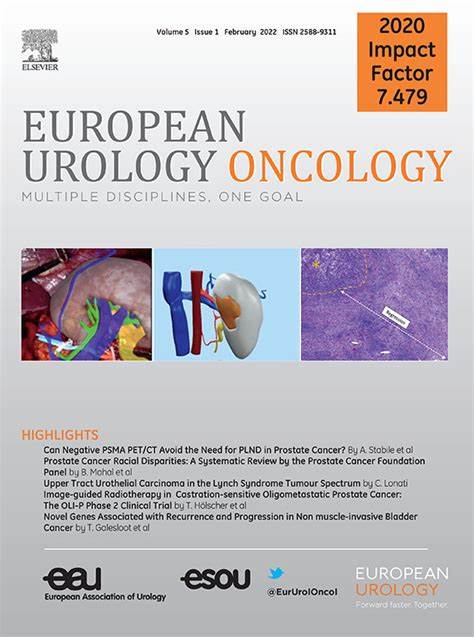Magnetic Resonance Imaging–based Prostate Cancer Screening in Carriers of Pathogenic Germline Mutations: Interim Results from the Initial Screening Round of the Prostate Cancer Genetic Risk Evaluation and Screening Study
IF 8.3
1区 医学
Q1 ONCOLOGY
引用次数: 0
Abstract
Background
The risk of early-onset and clinically aggressive prostate cancer is elevated in carriers of certain rare pathogenic germline mutations. The utility of augmenting traditional prostate-specific antigen (PSA)-based screening measures with multiparametric magnetic resonance imaging (MRI) in this population is not yet known.
Objective
To evaluate MRI-based screening in comparison with traditional PSA-based screening among individuals at an elevated genetic risk for prostate cancer.
Design, setting, and participants
Male germline carriers of pathogenic/likely pathogenic variants in any of 19 prostate cancer risk genes between the ages of 35 and 74 yr with no prior history of prostate cancer were recruited.
Intervention
Enrolled participants underwent screening with annual PSA, digital rectal examination (DRE), and triennial multiparametric MRI. Individuals with abnormal DRE, elevated age-adjusted PSA (>1.5 ng/ml for 35–49 yr, >2.0 ng/ml for 50–54 yr, and >3.0 ng/ml for 55–74 yr), or suspicious multiparametric MRI (Prostate Imaging Reporting and Data System [PI-RADS] ≥3 lesion) were offered prostate biopsy.
Outcome measurements and statistical analysis
Endpoints were diagnosis of any and clinically significant prostate cancer, and alternative screening strategies were compared by a decision curve analysis.
Results and limitations
To date, 101 males have completed the first round of screening. The greatest proportion of participants are carriers of BRCA2 (n = 44), BRCA1 (n = 35), and ATM (n = 7) variants. Twenty-one have undergone biopsy, resulting in the detection of nine cases of cancer (seven clinically significant). For the detection of clinically significant prostate cancer, abnormal MRI (PI-RADS ≥3) demonstrated 100% sensitivity (7/7) with a negative predictive value (NPV) of 100%, whereas PSA-based screening alone had 57% (4/7) sensitivity with an NPV of 73%. Of six screening strategies evaluated in the decision curve analysis, MRI-based screening alone achieved superior net benefit at all threshold probabilities compared with PSA screening—detecting one additional cancer case per 7.5 patients, while avoiding more unnecessary biopsies at the same threshold probability.
Conclusions
Disease prevalence is high among carriers of prostate cancer–associated pathogenic germline mutations. Early results suggest that MRI-based screening enhances early detection of clinically significant disease beyond PSA screening alone.
Patient summary
In this study, we present the interim results from the PROGRESS prostate cancer screening trial. We found that in certain germline carriers of prostate cancer risk mutations, magnetic resonance imaging–based screening enhances detection of prostate cancer while reducing biopsies triggered, in comparison with traditional prostate-specific antigen screening strategies.
基于磁共振成像的致病基因突变携带者前列腺癌筛查:前列腺癌遗传风险评估和筛查研究》首轮筛查的中期结果。
背景:某些罕见致病基因突变的携带者罹患早发性和临床侵袭性前列腺癌的风险较高。利用多参数磁共振成像(MRI)增强基于前列腺特异性抗原(PSA)的传统筛查措施在这一人群中的实用性尚不清楚:目的:在前列腺癌遗传风险较高的人群中,评估基于 MRI 的筛查与基于传统 PSA 的筛查的比较:招募年龄在 35 岁至 74 岁之间、既往无前列腺癌病史的 19 个前列腺癌风险基因中任何一个基因的致病性/可能致病性变异的男性种系携带者。干预措施 入选者接受每年一次的前列腺特异性抗原(PSA)筛查、数字直肠检查(DRE)和三年一次的多参数核磁共振成像检查。DRE异常、年龄调整后PSA升高(35-49岁>1.5纳克/毫升,50-54岁>2.0纳克/毫升,55-74岁>3.0纳克/毫升)或可疑的多参数磁共振成像(前列腺成像报告和数据系统[PI-RADS]≥3病变)者将接受前列腺活检。结果测量和统计分析 终点是诊断出任何前列腺癌和有临床意义的前列腺癌,并通过决策曲线分析对其他筛查策略进行比较:迄今为止,共有 101 名男性完成了第一轮筛查。最大比例的参与者是 BRCA2(44 人)、BRCA1(35 人)和 ATM(7 人)变异的携带者。21 人接受了活组织检查,结果发现了 9 例癌症(7 例有临床意义)。对于有临床意义的前列腺癌的检测,异常 MRI(PI-RADS ≥3)的灵敏度为 100%(7/7),阴性预测值 (NPV) 为 100%,而单独基于 PSA 的筛查灵敏度为 57%(4/7),NPV 为 73%。在决策曲线分析中评估的六种筛查策略中,在所有阈值概率下,单独基于 MRI 的筛查都比 PSA 筛查获得了更高的净收益--每 7.5 例患者中多发现一例癌症病例,同时在相同的阈值概率下避免了更多不必要的活检:结论:前列腺癌相关致病基因突变携带者的患病率很高。早期结果表明,基于磁共振成像的筛查比单纯的 PSA 筛查更能提高临床重大疾病的早期发现率。患者总结:在本研究中,我们介绍了 PROGRESS 前列腺癌筛查试验的中期结果。我们发现,与传统的前列腺特异性抗原筛查策略相比,对于某些前列腺癌风险突变的种系携带者,基于磁共振成像的筛查可提高前列腺癌的检出率,同时减少活检次数。
本文章由计算机程序翻译,如有差异,请以英文原文为准。
求助全文
约1分钟内获得全文
求助全文
来源期刊

European urology oncology
Multiple-
CiteScore
15.50
自引率
2.40%
发文量
128
审稿时长
20 days
期刊介绍:
Journal Name: European Urology Oncology
Affiliation: Official Journal of the European Association of Urology
Focus:
First official publication of the EAU fully devoted to the study of genitourinary malignancies
Aims to deliver high-quality research
Content:
Includes original articles, opinion piece editorials, and invited reviews
Covers clinical, basic, and translational research
Publication Frequency: Six times a year in electronic format
 求助内容:
求助内容: 应助结果提醒方式:
应助结果提醒方式:


